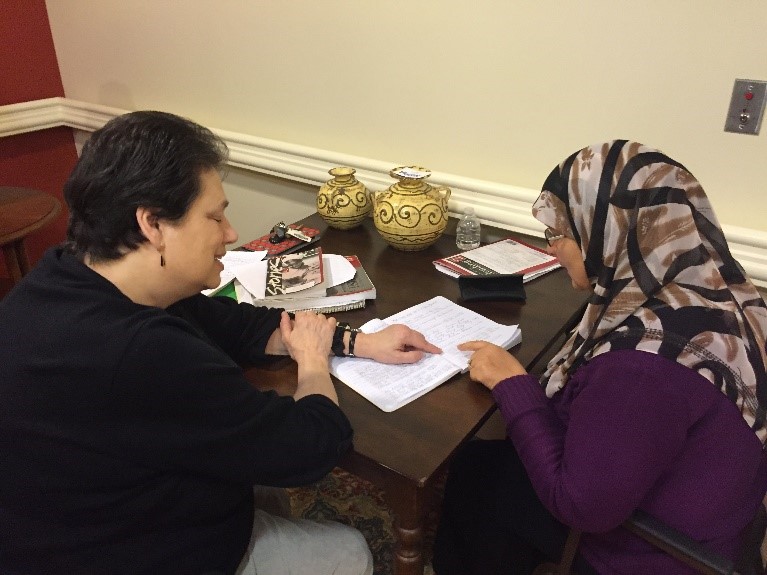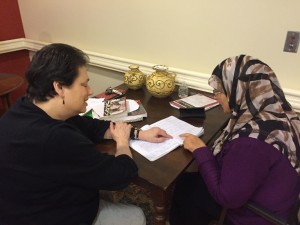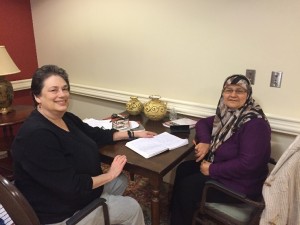
Volunteerism Works: Citizenship for Mina (PHOTOS)
By Guest Blogger, Norma Dancis
Ingleside at King Farm resident
In 2012, I began teaching Mina Azizi, through the Literacy Council of Montgomery County, to learn to speak, read, and write English. Most of all, she wanted to become a citizen. These were massive tasks. She, her translator husband, and her children arrived in the United States from Afghanistan in 1998. Like most Afghan women, she had never gone to school and was illiterate in Farsi, her native country’s language. She couldn’t count change or tell time because she knew no arithmetic. She spoke only a little English, mostly kids’ slang: “zip it” rather than “be quiet.” She had no idea of history or geography.
Now she has time to learn. Her ten children are mostly in college or beyond. One daughter is a doctor. She still takes care of a grandchild before and after school. We have worked together since then, first in the Atrium and now in the Fifth Floor elevator lobby. In 2015, she began preparing for citizenship. We spent nearly an entire year working on reading, writing, and answering the civics questions. She failed the first time, but persevered. Many residents recognize Mina by her hijab and ask me periodically about her progress.
I am proud that This February, she passed the citizenship test. We celebrated with apple pie. After all, what is more American?
After hearing Norma’s story, we were intrigued. We met up with her to ask a few follow-up questions. Check them out below!
1. Tell me a little about your background: Where you grew up, your family life and career.
I was born in Pittsburgh. I planned to be a professor – have two degrees in Linguistics. That never happened as during that time many places were getting rid of language programs. I worked mostly as a legal secretary and began tutoring in 1989 in Pennsylvania. I began tutoring in Montgomery County, Maryland in 1988. When I first started as a tutor, I was tutoring new tutors how to teach. I specialized in pronunciation. I have one daughter and two grandchildren.
2. How did you get involved with the Literacy Council of Montgomery County?
I got involved when my daughter was graduating high school and I wanted something to fill my time. I did some reading tutoring when I was in high school, but I wasn’t very good at it. I thought I’d try it again and I wanted to be better at it.
3. About how many students have you helped achieve citizenship status in the United States?
Mina is only the second student I’ve help gain citizenship status. I once had about 20 students whom I tutored from Korea. They weren’t seeking citizenship, but they went back to Korea to then teach English.
4. What are some of the most memorable things you’ve learned from one of your students?
I love learning how different their backgrounds are. For example, I had one Korean student who told me her favorite thing about America was “potlucks.” In her culture, those types of gatherings are typically a more formal affair, and she enjoyed how casual American potlucks were.
5. Today’s environment has become difficult for many immigrants. What would you say to people who think negatively about immigrants in the united states?
I would tell them that immigrants are extremely attached to this country. They love how different it is from their home county and how much better it is. They are so excited when they become citizens. They really appreciate this country. One student even said to me: “Oh, you’ve opened my eyes,” when referring to the United States and the things she’s learned about the U.S. thus far.
6. What advice or guidance would you give to someone considering becoming a tutor for immigrants?
I would tell them that it’s extremely rewarding. You just have to have a lot of patience. Adults learn slower than children. Some haven’t gone to school, and therefore, don’t even know how to learn.
7.Is there anything else you’d like to add?
Tutoring is really a huge amount of fun. I enjoy meeting a lot of different people and getting to know them in depth. It’s like having children again and watching them grow and go out into the world. The main difference between teaching children and teaching my students is that you have to “un-teach” them all the bad English they’ve learned. Mina, for example, was learning English from her children; so Instead of saying “be quiet,” she would use “Zip it.”




Engage us on Facebook
Follow us on Twitter
Tweets by @mymcmedia